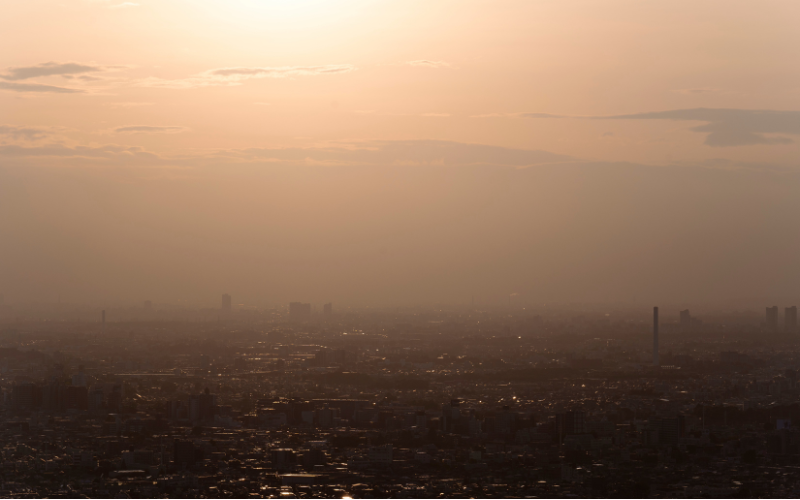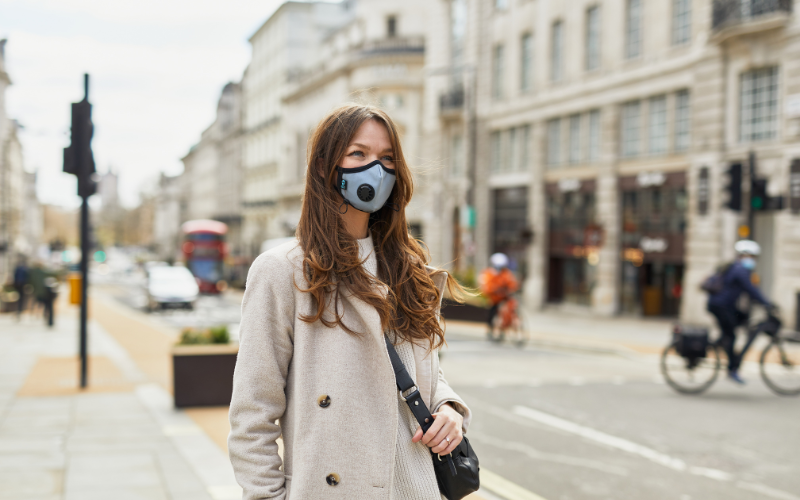
Understanding the Link Between Air Pollution and Seasonal Allergies
As the seasons change, many of us look forward to the vibrant colors of autumn or the fresh blooms of spring. However, for millions of Americans, these transitions signal the onset of seasonal allergies, accompanied by sneezing, itching, and congestion. Interestingly, there's a growing body of research indicating a significant link between air pollution and the severity of these allergies. In this blog, we'll explore what air pollution and seasonal allergies are, how they are connected, and how you can protect yourself and improve your home environment. Plus, we’ll introduce you to Cambridge Mask Co's innovative smoke masks, which provide the perfect protection against allergens and poor air quality.
What is Air Pollution?

Air pollution refers to the presence of harmful substances in the air we breathe. These pollutants can be in the form of gases, like carbon monoxide or sulfur dioxide, or particulate matter, such as dust, pollen, soot, and smoke. Common sources of air pollution include vehicle emissions, industrial activities, wildfires, and even household activities like cooking and heating.
Types of Air Pollutants
- Particulate Matter (PM10 and PM2.5): Tiny particles that can penetrate deep into the lungs and bloodstream, causing respiratory issues and other health problems.
- Nitrogen Dioxide (NO2): A toxic gas emitted from vehicles and industrial processes, contributing to respiratory diseases.
- Sulfur Dioxide (SO2): Produced by burning fossil fuels like coal and oil, it can cause acid rain and respiratory problems.
- Ozone (O3): Formed when sunlight reacts with pollutants from vehicles and industry, it can cause breathing difficulties and aggravate lung diseases.
- Volatile Organic Compounds (VOCs): Emitted as gases from certain solids or liquids, they can cause eye, nose, and throat irritation, headaches, and damage to the liver, kidney, and central nervous system.
What are Seasonal Allergies?
Seasonal allergies, also known as hay fever or allergic rhinitis, occur when your immune system overreacts to allergens in the environment. Common allergens include pollen from trees, grasses, and weeds, as well as mold spores. Symptoms of seasonal allergies can range from mild to severe and typically include sneezing, itchy eyes, runny nose, and congestion.
Common Seasonal Allergens
- Tree Pollen: Common in early spring, coming from trees like oak, birch, and maple.
- Grass Pollen: Peaks in late spring and early summer, from grasses like Bermuda, Timothy, and Kentucky bluegrass.
- Weed Pollen: Most prevalent in late summer and fall, with ragweed being a significant contributor.
- Mold Spores: Can be a problem throughout the year, especially in damp conditions, thriving in areas like basements, bathrooms, and outdoors in piles of leaves or compost.

The Link Between Air Pollution and Seasonal Allergies
Recent studies have shown that air pollution can exacerbate the symptoms of seasonal allergies. Pollutants like ozone and particulate matter can irritate the respiratory system, making it more sensitive to allergens. Additionally, air pollution can increase the amount of pollen produced by plants and extend the pollen season, leading to longer and more intense allergy symptoms.
How Air Pollution Worsens Allergies
- Increased Pollen Production: Higher levels of CO2 can stimulate plants to produce more pollen, increasing the overall pollen count.
- Enhanced Allergenicity: Pollutants can alter the protein structure of pollen, making it more allergenic and likely to trigger stronger allergic reactions.
- Respiratory Irritation: Pollutants can irritate the airways, increasing sensitivity to allergens and worsening symptoms like sneezing, coughing, and congestion.
- Prolonged Allergy Season: Changes in climate and pollution levels can extend the duration of pollen seasons, causing prolonged exposure to allergens.
Improving Your Home Environment
To protect yourself from seasonal allergens and poor air quality, it's essential to create a clean and safe indoor environment. Here are some tips to help you reduce exposure to allergens and pollutants in your home:
Tips for a Healthier Home
- Use Air Purifiers: Invest in a high-quality air purifier with a HEPA filter to remove allergens and pollutants from the air. Air purifiers can capture fine particulate matter, pollen, and other airborne allergens, significantly improving indoor air quality.
- Keep Windows Closed: During high pollen days, keep windows and doors closed to prevent allergens from entering. Use air conditioning to keep your home cool and ventilated without exposing yourself to outdoor allergens.
- Clean Regularly: Vacuum with a HEPA filter, dust surfaces with a damp cloth, and wash bedding frequently to reduce indoor allergens. Pay special attention to carpets, upholstery, and curtains, as they can harbor dust mites and pollen.
- Control Humidity: Use dehumidifiers to keep indoor humidity levels below 50% to prevent mold growth. Mold thrives in damp environments, so controlling humidity can help reduce mold spores in your home.
- Use Non-Toxic Cleaners: Choose cleaning products that are free from VOCs and other harmful chemicals. Many conventional cleaning products can release VOCs, which can aggravate respiratory issues and allergies.
Where Should I Look for a High-Quality Mask for Sale?
Finding a high-quality face mask or respirator is crucial for effective protection against seasonal allergens and air pollution. Here are some tips on where to look:
Reliable Sources for High-Quality Masks
- Official Brand Websites: Always check the official websites of reputable mask brands like Cambridge Mask Co. This ensures you’re purchasing genuine products with verified filtration efficiency.
- Authorized Retailers: Look for masks at authorized retailers and resellers. Cambridge Mask Co provides a list of authorized sellers on their website.
- Medical Supply Stores: Many medical supply stores stock high-quality respirators and allergen masks designed for optimal protection.
- Online Marketplaces: Websites like Amazon can be reliable if the seller is reputable and the product has good reviews. Ensure the mask meets safety and filtration standards.
- Pharmacies and Drugstores: Large chain pharmacies often carry trusted brands of face masks and respirators.
When shopping for a mask, prioritize features such as multi-layer filtration, a secure fit, and comfort for long-term wear. Cambridge Mask Co, for example, offers masks with military-grade filtration technology and adjustable features for a snug fit.
Cambridge Mask Co: The Perfect Protection
When it comes to protecting yourself from poor air quality and seasonal allergens, Cambridge Mask Co offers a solution that combines cutting-edge technology with exceptional comfort. Their smoke masks are designed to filter out pollutants and allergens, providing a high level of protection for everyday use.

Why Choose Cambridge Mask Co?
- High-Quality Filtration: Cambridge masks are equipped with military-grade filtration technology that blocks PM2.5, PM10, pollen, smoke, and other harmful particles. This advanced filtration system ensures that you are breathing cleaner, safer air.
- Comfort and Fit: Designed with adjustable straps and a snug fit, these masks ensure comfort even during prolonged use. The ergonomic design and soft materials reduce pressure points and discomfort, making them ideal for daily wear.
- Reusable and Sustainable: Cambridge masks are washable and reusable, making them an eco-friendly choice compared to disposable masks. By choosing a reusable mask, you can reduce waste and environmental impact while still enjoying high levels of protection.
- Versatile Use: Ideal for daily wear, whether you're commuting, traveling, or spending time outdoors during high pollen days. Cambridge masks are suitable for a variety of activities and environments, providing reliable protection against both pollutants and allergens.
By using a Cambridge Mask Co face mask, you can significantly reduce your exposure to airborne allergens and pollutants, helping to alleviate the symptoms of seasonal allergies and protect your overall health.
Conclusion
Understanding the link between air pollution and seasonal allergies is crucial for managing your symptoms and maintaining good health. By taking steps to improve your home environment and using protective measures like Cambridge Mask Co's smoke masks, you can reduce your exposure to allergens and pollutants. Remember, investing in your health and comfort is always worth it. Stay informed, stay protected, and enjoy the seasons with confidence.
For more information and to explore the range of face masks offered by Cambridge Mask Co, visit their website and take the first step towards better respiratory health today.


